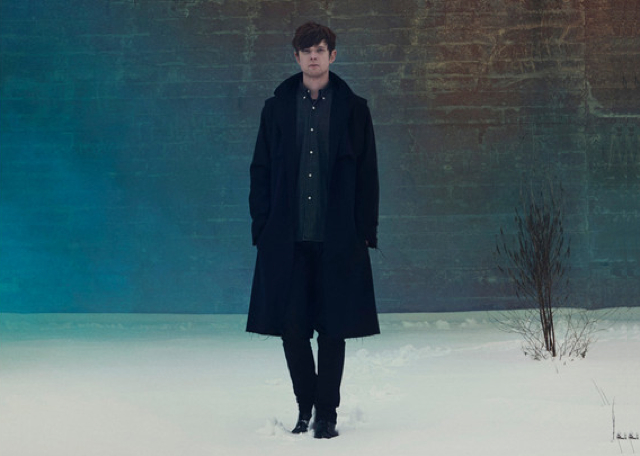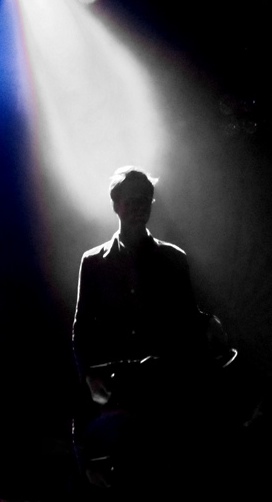You have no items in your cart. Want to get some nice things?
Go shopping
No matter how depressed James Blake may get, he’ll never be as depressed as someone who isn’t James Blake. Someone who isn’t world famous. Someone who doesn’t have the attention of millions and the talent to deserve it. I’m not saying James Blake isn’t capable of genuine sadness; I’m just saying he isn’t capable of the type of sadness the rest of us are capable of: the type where you don’t know what you’re good for or where you belong or if you’re even worth the space you occupy.
I don’t even know for sure James Blake is sad. In fact, I would bet he’s not sad. I mean, he’s James Blake — what’s there to be sad about? He’s put out four critically acclaimed albums and he’s 24 years old. What’s there to be sad about?
On the cover of his latest single, “Retrograde”, he’s standing alone, in the snow, in a pea coat. He looks lonely. But then I remember he’s standing there with a photographer, with a photographer’s crew, and that I’m one of millions looking at him being lonely, which isn’t the same thing as being lonely when you’re all alone. It’s a sexy imitation of loneliness. But here’s my point: James Blake is better than all of us.
I’ve assembled a James Blake playlist and I’m listening through in chronological order, old stuff to new stuff, all of it, and there’s not very much. According to Spotify, one hour of music. I can listen three times before lunch.
When James Blake’s first EP, CMYK, came out he was 21 years old. CMYK is weird. Probably his weirdest. These songs are rough, more cut-and-paste than his later work. You can feel the edges. As far as I can tell, not a single word is sung by Blake. It’s all sampled, snatched, constructed. He creates phrases word by word, letter by letter, like ransom notes. The experience is fragmented, more like looking through a sketchbook than looking at a painting, more like hearing ideas for songs than songs themselves.
But what really matters here — what really matters about CMYK — is that James Blake was TWENTY-ONE when he made it.
There is this idea that if you work hard enough for long enough you will eventually achieve some level of mastery, some level of genius. I’ve heard people go so far as to say talent doesn’t exist. It’s a hopeful thought — that we don’t have to be born artists to become artists, that we can construct ourselves through sheer force of will — but what do you do about the James Blakes? What do you do about the Laura Marlings? Or the fact that I read Susan Sontag’s journals this summer — things she never meant to be published — and even at 16, even at her most candid, she was more talented, more thoughtful, more brilliant than I will ever be. The fact is, some people are born to be spectacular.
That said, I’m not sure CMYK is very good. It’s almost too James Blakey even for James Blake. It’s as if he is living his career in reverse, becoming more accessible as he goes.
It’s a relief when my playlist reaches Klavierwerke EP. I’ve spent time with these songs. They’re familiar, rewarding, almost (already) nostalgic. They remind me of early mornings at the coffee shop writing shitty fiction. They remind me of late nights at the ad agency writing shitty ads. In contrast to CMYK, these songs are songs. They go places, take you places, and that’s what I mean when I say they’re “rewarding” — they’re songs I like as opposed to songs I’m interested in.
There is still no hint on Klavierwerke of what will become two of Blake’s strongest assets: his weirdly soulful voice, his lyrics. Klavierwerke still sets Blake in the realm of mad scientist: these songs are creations, experiments. There is still a sense here of tinkering. But it’s a huge step forward, I think, from CMYK. He’s taken all the little pieces and tinkered them into mechanisms, machines. This is an album that functions. And it is a strong indicator of where his music is heading.
At this point, Blake is still 21 years old.
And I was wrong, actually. There is a hint of Blake’s voice on this album. He has shifted from sampling other people to sampling himself. In retrospect, there’s no mistaking it.
I’ve just done a bit of research (something I do from time to time) and found out
CMYK was not, as I said earlier, James Blake’s first release. It was his third.
Prior were Air & Lack Thereof (2009) and The Bells Sketch (2010). The reason I didn’t know about these is embarrassing: They’re not on Spotify. But whatever, their existence only reinforces what seem to be my only two points: James Blake is really fucking talented, and James Blake is really fucking young.
And that’s what I mean when I say James Blake could never know the sadness of not being James Blake. He has already earned his keep.
The photograph on the cover of James Blake’s self titled LP is the exact same photograph as the cover of Klavierwerke EP, but instead of being tinted grey, it’s tinted blue. The photo is of James Blake fidgeting over a long exposure: He is a ghost of himself.
These songs, I think, are his best. James Blake is singing now. James Blake is singing words. James Blake is singing words he wrote. And they’re good: They are good, honest words — free of spectacle. He’s not trying to impress anybody, which, at 22, is impressive.
His music is classified as dubstep, but maybe it’s his departure from the genre that says the most about him. Instead of wowing, dazzling, blowing people away, James Blake’s version of dubstep sits back and shrugs. He has the effortless confidence of a man who has already accomplished more than most people will in their entire lives: which is, of course, exactly who he is. Even on songs like “I Never Learnt to Share” and the Feist cover “Limit to Your Love”, songs that throb, there is still a professional restraint, a subtlety: James Blake is in absolute control of everything.
But maybe the result of being so young, so talented, so successful is that you’re forced to become a ghost of yourself. The idea of you becomes bigger than the reality. And maybe then you experience a loneliness no one else could understand, no one else could relate to — you are separated even from yourself — which is maybe the worst loneliness there is.

Enough Thunder, James Blake’s second full-length album, is like an echo off a wall. The self-titled debut resonated so deeply something was bound to bounce back.
Enough Thunder has its moments (the Bon Iver collaboration, the Joni Mitchell cover) but for the most part it obeys the law of echoes and diminishes in its returns. It is good, but it’s nothing new. It does not make the vast leaps his previous albums made over each other, each snowballing from the last. Enough Thunder is a stall, and it raises the inevitable question: What now?
This, of course, is the danger of young fame and talent. No one can sustain a meteoric career. And now James Blake is 24, which is still really fucking young, but not quite as fucking young as 21, which wasn’t quite as fucking young as 20.
But to be honest I don’t think his youth was ever really the point, despite this big deal I’ve made out of it. I don’t think it was ever even a novelty, except to people like me who are obsessed with how old people are when they do incredible things. And I think the reason I am obsessed with how old people are when they do incredible things is because, at 25, I’m already afraid my life has passed me by.
This is a fear James Blake, because he is James Blake, will never understand.
On the cover of his newest single, “Retrograde,” James Blake is standing alone, in the snow, in a pea coat. He is standing alone with a photographer. He is standing alone with a photographer’s crew. He is standing alone and I am looking at him standing alone, and I am at my desk, in my office, where I am wondering what I’m good for, where I belong, if I’m even worth the space I occupy. And here’s the thing about this new song, “Retrograde,” here’s the thing about it: It’s spectacular.

About Mike Nagel
Mike Nagel is an advertising copywriter. He and his wife live in Dallas, Texas. Follow him on twitter @misternagel.


Very funny #EssaySaturday today by
@misternagel, for anyone who’s ever silently cursed the young and successful. https://t.co/fBVD9DWUKs
Even if it had no typos, (copy and past; subtly, instead of subtlety) this article would still stink. How about considering the sadness of a man petrified that his best years are behind him, even though he is only in his 20s? How about coming up with more insightful, less subjective words than “I’m not sure CMYK is very good. It’s almost too James Blakey even for James Blake”?
Your focus on Blake’s “incredible things” seems to be a focus only on fame, as if without fame, a life is meaningless. When you get past 25, you’ll realise lives can take meaning from themselves, without needing vindication from others. James Blake will no doubt take satisfaction less from critical acclaim, and more from whether he personally feels he has pushed himself as far as he can go with his music, whether he feels his music is good enough to deserve acclaim.
Thank you for spotting the typos – an editing oversight!
I think a lot of this is fair. The article is extremely subjective and, at times, purposefully myopic. If I had more insightful things to say, I probably would have said them. And I really hope you’re right about getting past 25 and realizing life can have meaning in and of itself. I think that’s a hopeful, beautiful thought. Sorry you didn’t enjoy the article, but thank you for reading, and thank you for taking the time to comment.
All the best,
Mike
And when I said, “I think a lot of this is fair.” I meant: “I think a lot of your comment is fair.” Just to be clear :)